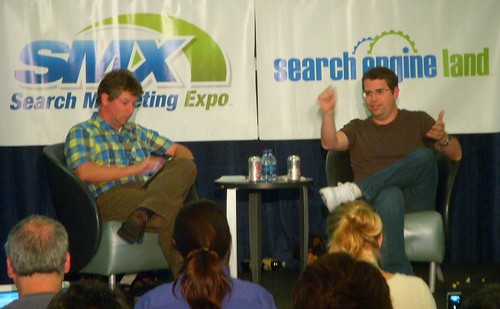At the SMX Advanced conference in Seattle last week, the keynote session with Matt Cutts has become an expected feature, but it’s also one of the most highly anticipated and attended sessions of the entire conference. The search engines love to take advantage of search marketing conferences to make major announcements, and Matt Cutts has been known to drop both major and minor bombshells during these sessions. For instance, during last year’s session, he stated that the practice of “link-sculpting” (using “nofollow” parameters on links to advantageously design the flow of PageRank within a site) was now pointless, because Google had implemented nofollow such that it did not conserve PageRank, but instead a nofollowed link merely evaporated PR.
It was clear at this year’s “You & A With Matt Cutts” that he and Danny Sullivan had planned in advance to launch directly into addressing one of the top most-recent issues of interest to webmasters: the “Mayday Update” — so-named because the algorithmic shift occurred roughly around the first week of May, and because affected webmasters were left with a helpless feeling after their pages dropped in rank for long-tail search queries.

After the lifejackets and soda hijinks were over, Matt stated clearly and seriously that the Mayday Update was separate from and in no way caused by the Caffeine change. His statements further underscored statements he’d made earlier online. According to him, the ranking algorithm development team had decided, after consideration and testing, to publish a change based upon some “quality factors”, reducing the rankings of some deeper content pages for longer-tail queries.
Just as Vanessa Fox had opined in her piece on the Mayday Update, the weighting for keyword relevancy factors was likely reduced some in comparison to quality factors.
One thing that Matt suggested to those who wished to counteract Mayday’s effects was to redesign a site’s links so that they wouldn’t be as deep within the site structure. (From chatting with close colleagues at the conference, Chrstine and I also have a few other strategies for counteracting Mayday effects, which we intend to keep in confidence for the benefit of our clients only.)

(My opinion is that he answered this question truthfully, to the best of his knowledge, but his overly careful and hesitant phrasing made it come across as someone trying to provide a limitedly-true statement while dancing around the intent of a quesiton — rather similar to how one must carefully phrase a wish to a genii in the bottle or else get the wish answered in a literal-yet-unintended fashion. But, you have to cut the guy a break on this — when he answers a question with a flat-out, simple answer, people dissect it to death, searching for exception cases or conspiracy. So, no wonder he’s trying to carefully and specifically anticipate every permutation of the question and answer!)
Throughout the conference, Matt tried to further emphasize how marketers should try to pursue user experience, since that’s what the search engines themselves are pursuing, instead of obsession upon ranking factors. He suggested that ranking factors change over time and have a more limited lifespan than usability and user-experience criteria, so user-centered design is far more sustainable over the longterm. The continued focus on user experience is gratifying to hear, as it’s a philosophy we’ve endorsed for a long time as well.










The MayDay update seems to have had the opposite impact on long tail search engine results, removing authority sites long tail and replacing them with poorer quality sites.